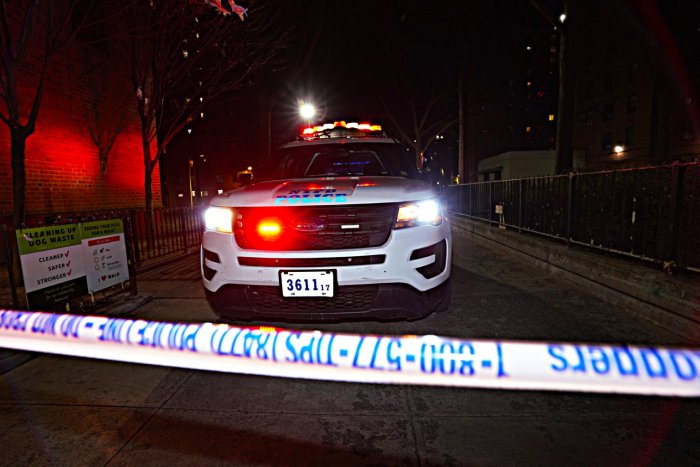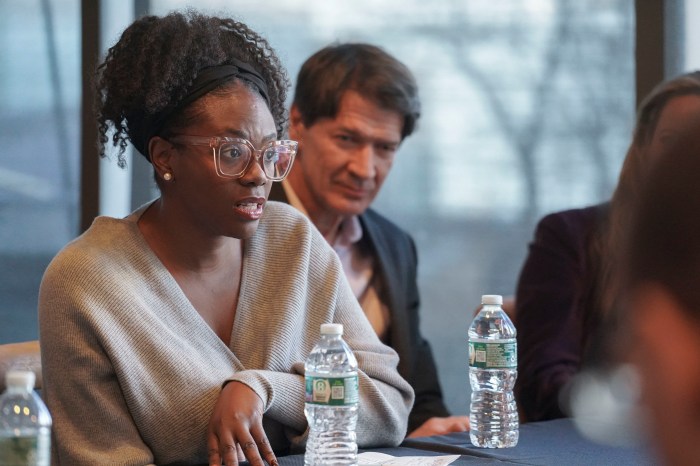By Helen Klein
A new small high school in an under-utilized public school building sounds like a good thing, especially given the financial constraints caused by lack of state funding for the city Department of Education’s capital construction plan.Certainly, DOE thought so, when it proposed siting the new Kingsborough Early College School at Montauk Intermediate School, I.S. 223, 4200 16th Avenue, which is only at about 50 percent of capacity. The school is one of 36 new smaller secondary schools announced earlier this month by Mayor Michael Bloomberg and Schools Chancellor Joel KleinAccording to Carlo Scissura, the president of the CEC, the plan is to enlarge the new high school by 80 students a year for seven years. The school, he said, would co-exist alongside the current intermediate school housed in the building. Admission to the program would be by lottery. Students entering the program would start in sixth grade.But, area residents clearly were not enamored of the idea. They turned out en masse at a meeting hosted by the District 20 Community Education Council (CEC), at Public School 164, 4211 14th Avenue, to protest the plan, which they contended would create problems for the tightly-knit Borough Park community, largely composed of Orthodox Jews, in which the school would be situated.Chorus of No’s“We don’t want a high school here,” asserted David Weiss. “Our quality-of-life would be compromised, our neighborhood jeopardized. A high school in our community is a challenge to our culture, a confrontation to our religion. Don’t minimize the issue by saying it’s a small school. A small school with 500 students is big stakes. We don’t a high school with even one kid.”Moshe Gold agreed. “Our community, our whole life is instilling and raising our children to high moral standards, community-mindedness and religion,” he told his listeners. “We feel if the nature of this school is changed, it will compromise our values.”Helen Goldberg pointed out that, within the Orthodox Jewish community, “It is our right to take our children into other cultures. This kind of school,” she said, “is going to bring a different type of culture into our community. It is a breach of our trust in the government of the city.”“We can’t have a high school here,” added Max Perlstein. “It has nothing to do with wanting them to have an education or not. It’s a fact they don’t have ethnic sensitivity. It’s a fact it would encroach on our community.”“This is not a discussion of anybody downgrading anybody else,” Fishel Schachter told the crowd. “We are sensitive to schools that are overcrowded and we as a community will do anything possible to help that. I teach in a yeshiva near a high school, and we have massive problems because children are insensitive to each other. As much as I try to train my students and the people at the public school train their students about ethnic sensitivity, when it gets to this age, adolescence, it doesn’t work.“A tiny spark,” Schachter warned, “bursts into a flame. One child says something insensitive to another child, whether it’s from our community to them, or them to us, and suddenly there are desks flying and fists flying and knives flying. As a parent and an educator, I’m concerned. I’m scared that a little high school is going to a big high school, that a little insensitive remark will turn into blood that is flowing from innocent children.”Representatives SpeakElected officials representing Borough Park concurred. Assemblymember Dov Hikind blasted the, “Plan foisted on the community without our involvement.” In proposing a small high school, “To encourage children to do better,” Hikind said that DOE’s “intentions are wonderful. This kind of high school is wonderful.“But,” he went on, “not in our community. In neighboring communities, we want this kind of school, we want children to have these opportunities. But, there are real issues we all have to be sensitive about. We have to be sensitive to a community whose cultural values are the kind of values we have in our community, where people dress in a certain way. This city and this country are about respecting the difference of other people. This means respecting what our community is all about. We do not want a high school in this community. Period. No discussion.”City Councilmember Simcha Felder said that, “Irrespective of cultural insensitivity,” the issue was one of safety. “It’s about, I, for example, have this junior high school child at Montauk and I want my child to be safe. That’s what this is about. We know there is a history that when you mix a junior high school with a high school, you’re asking for an explosion. That’s what the issue is.”Issue of OvercrowdingAnother issue, brought to the floor by District 20 teacher Yael Siegelman, who teaches at a neighboring intermediate school, John J. Pershing Intermediate School, I.S. 220 at 4812 Ninth Avenue, is the need for District 20 middle schools to have their over-crowding relieved. With Montauk at only about 50 percent of capacity, she said, the school could hold the key to reducing class size and improving pedagogy at other District 20 schools, namely Pershing; William McKinley Intermediate School, I.S. 259, 7305 Fort Hamilton Parkway; and Edward B. Shallow Intermediate School, I.S. 227, 6500 16th Avenue.Her story, Siegelman said, was one, “Of education in decline at three of our district’s largest middle schools, McKinley, Shallow and Pershing.” All three schools, she said, are way over capacity, and student performances, she suggested, are suffering as a result.What is Siegelman’s solution? Rather than putting a small high school into Montauk, she suggested expanding the intermediate school program there. “In the best interests of students in the district,” Siegelman contended, “we should use the opportunity to fill the Montauk building with additional students from the district to ease the pressure on overcrowded schools. If no action is taken, the education of nearly 5,000 students will continue to decline.”Looking AheadWhile the CEC has no role in the process, which is controlled by the mayor, the chancellor and the DOE’s Office of New Schools, Scissura said that the council wanted to allow area residents to voice their concerns. “This is not a proposal we will ever have any vote on,” Scissura told the standing-room-only crowd. “As community leaders, we have an obligation to listen to the community and bring their thoughts to the mayor and the chancellor.“Please understand,” he told the crowd, “that we think Montauk is a wonderful school, that the teachers are great, the students are great, the principal is wonderful. Whatever we do will be in the best interests of the students of Montauk.”The day after the public meeting, a meeting was held that was attended by representatives of the CEC and District 20, Hikind and Felder and other representatives of the Orthodox Jewish community, and Dennis Walcott, who is the deputy mayor in charge of education. The topic was the fate of the proposed small high school. According to Scissura, who was one of those at the meeting, it was “pleasant.” No change of policy as a result of the meeting has yet been announced.


































